MGMT 201: Individual Differences and Emotions - Chapter 3 Review
VerifiedAdded on 2020/03/02
|7
|917
|155
Homework Assignment
AI Summary
This document presents the solutions to a quiz on Chapter 3, focusing on individual differences and emotions. It includes answers to true/false questions, multiple-choice questions, and an essay question. The true/false questions assess understanding of self-efficacy, its components, and its impact on behavior and management strategies. The multiple-choice questions test knowledge of key terms like CSE (Core Self-Evaluation), self-efficacy, and self-esteem, as well as their relationships to job performance, emotional stability, and locus of control. The essay question requires a definition of emotional intelligence, its components (personal and social competence), and its benefits, including its relationship to job performance and leadership effectiveness. This resource is designed to help students understand and apply the concepts of individual differences and emotions in a management context.
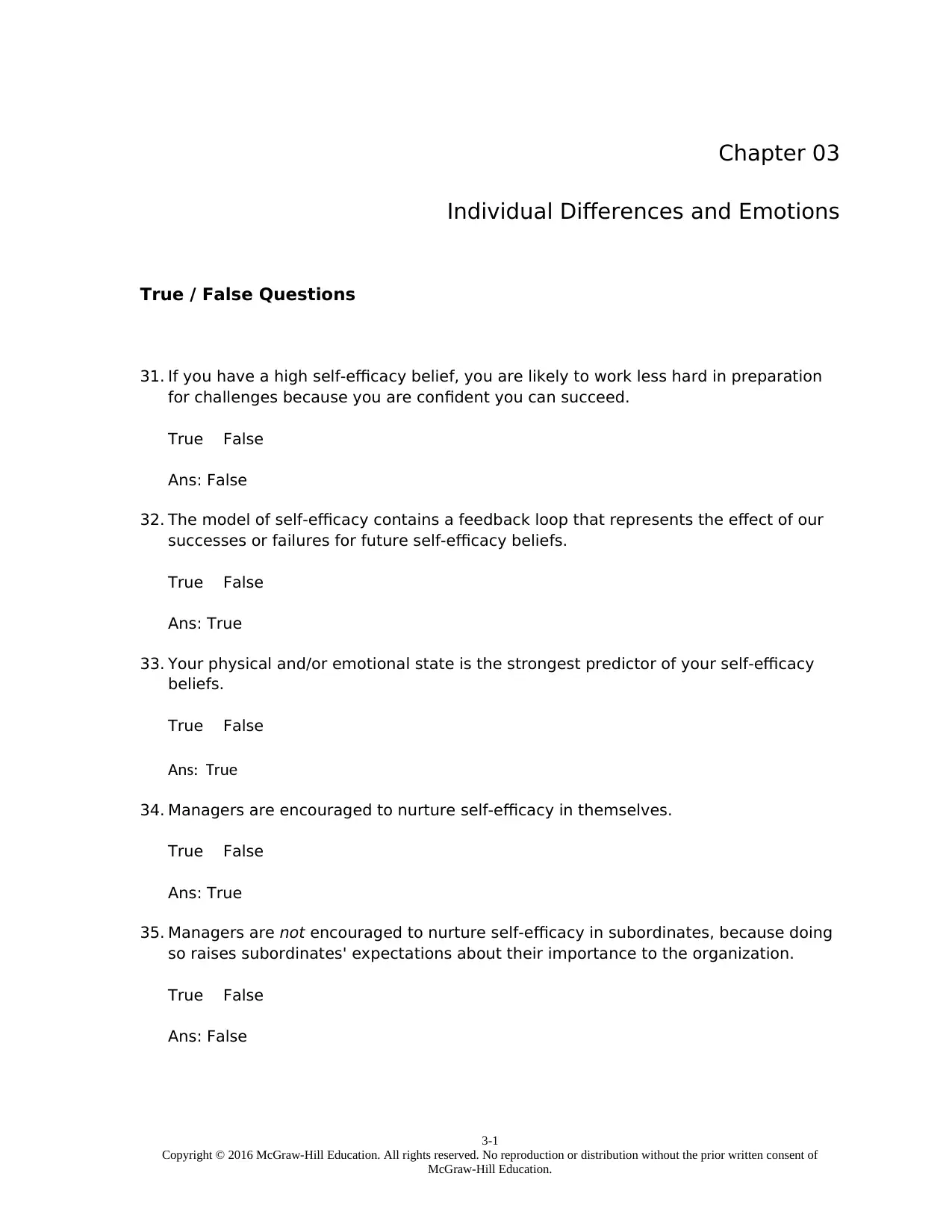
Chapter 03
Individual Differences and Emotions
True / False Questions
31. If you have a high self-efficacy belief, you are likely to work less hard in preparation
for challenges because you are confident you can succeed.
True False
Ans: False
32. The model of self-efficacy contains a feedback loop that represents the effect of our
successes or failures for future self-efficacy beliefs.
True False
Ans: True
33. Your physical and/or emotional state is the strongest predictor of your self-efficacy
beliefs.
True False
Ans: True
34. Managers are encouraged to nurture self-efficacy in themselves.
True False
Ans: True
35. Managers are not encouraged to nurture self-efficacy in subordinates, because doing
so raises subordinates' expectations about their importance to the organization.
True False
Ans: False
3-1
Copyright © 2016 McGraw-Hill Education. All rights reserved. No reproduction or distribution without the prior written consent of
McGraw-Hill Education.
Individual Differences and Emotions
True / False Questions
31. If you have a high self-efficacy belief, you are likely to work less hard in preparation
for challenges because you are confident you can succeed.
True False
Ans: False
32. The model of self-efficacy contains a feedback loop that represents the effect of our
successes or failures for future self-efficacy beliefs.
True False
Ans: True
33. Your physical and/or emotional state is the strongest predictor of your self-efficacy
beliefs.
True False
Ans: True
34. Managers are encouraged to nurture self-efficacy in themselves.
True False
Ans: True
35. Managers are not encouraged to nurture self-efficacy in subordinates, because doing
so raises subordinates' expectations about their importance to the organization.
True False
Ans: False
3-1
Copyright © 2016 McGraw-Hill Education. All rights reserved. No reproduction or distribution without the prior written consent of
McGraw-Hill Education.
Paraphrase This Document
Need a fresh take? Get an instant paraphrase of this document with our AI Paraphraser
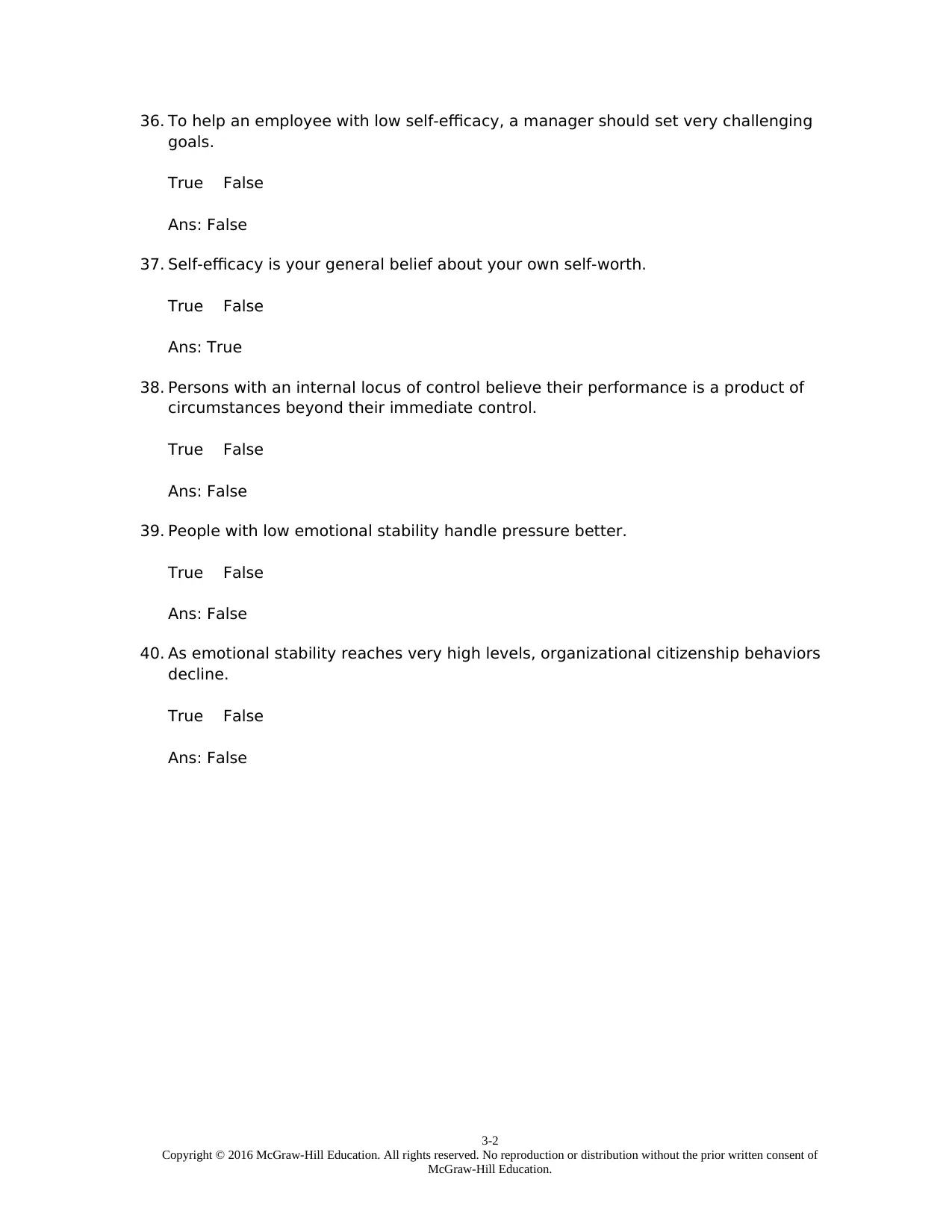
36. To help an employee with low self-efficacy, a manager should set very challenging
goals.
True False
Ans: False
37. Self-efficacy is your general belief about your own self-worth.
True False
Ans: True
38. Persons with an internal locus of control believe their performance is a product of
circumstances beyond their immediate control.
True False
Ans: False
39. People with low emotional stability handle pressure better.
True False
Ans: False
40. As emotional stability reaches very high levels, organizational citizenship behaviors
decline.
True False
Ans: False
3-2
Copyright © 2016 McGraw-Hill Education. All rights reserved. No reproduction or distribution without the prior written consent of
McGraw-Hill Education.
goals.
True False
Ans: False
37. Self-efficacy is your general belief about your own self-worth.
True False
Ans: True
38. Persons with an internal locus of control believe their performance is a product of
circumstances beyond their immediate control.
True False
Ans: False
39. People with low emotional stability handle pressure better.
True False
Ans: False
40. As emotional stability reaches very high levels, organizational citizenship behaviors
decline.
True False
Ans: False
3-2
Copyright © 2016 McGraw-Hill Education. All rights reserved. No reproduction or distribution without the prior written consent of
McGraw-Hill Education.
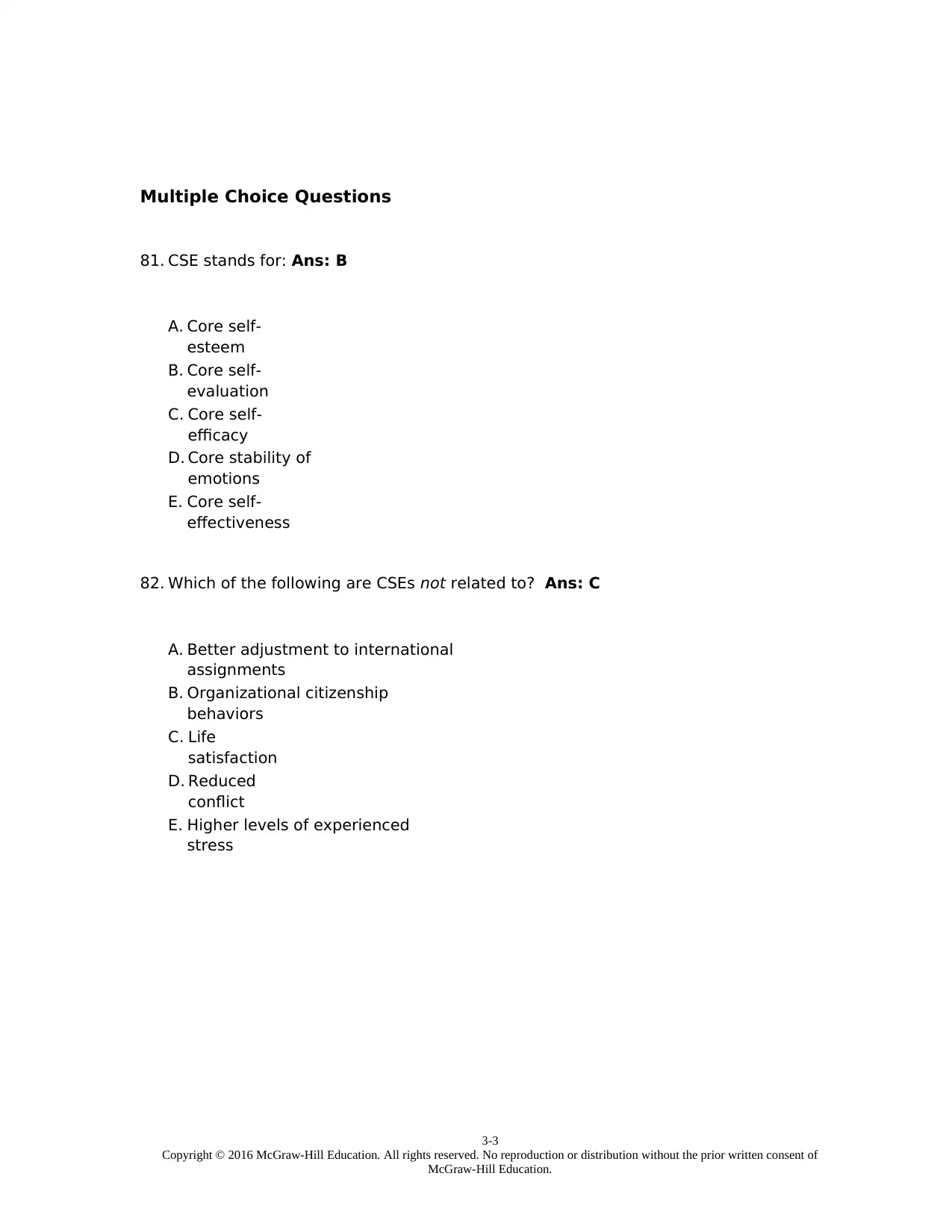
Multiple Choice Questions
81. CSE stands for: Ans: B
A. Core self-
esteem
B. Core self-
evaluation
C. Core self-
efficacy
D. Core stability of
emotions
E. Core self-
effectiveness
82. Which of the following are CSEs not related to? Ans: C
A. Better adjustment to international
assignments
B. Organizational citizenship
behaviors
C. Life
satisfaction
D. Reduced
conflict
E. Higher levels of experienced
stress
3-3
Copyright © 2016 McGraw-Hill Education. All rights reserved. No reproduction or distribution without the prior written consent of
McGraw-Hill Education.
81. CSE stands for: Ans: B
A. Core self-
esteem
B. Core self-
evaluation
C. Core self-
efficacy
D. Core stability of
emotions
E. Core self-
effectiveness
82. Which of the following are CSEs not related to? Ans: C
A. Better adjustment to international
assignments
B. Organizational citizenship
behaviors
C. Life
satisfaction
D. Reduced
conflict
E. Higher levels of experienced
stress
3-3
Copyright © 2016 McGraw-Hill Education. All rights reserved. No reproduction or distribution without the prior written consent of
McGraw-Hill Education.
⊘ This is a preview!⊘
Do you want full access?
Subscribe today to unlock all pages.

Trusted by 1+ million students worldwide
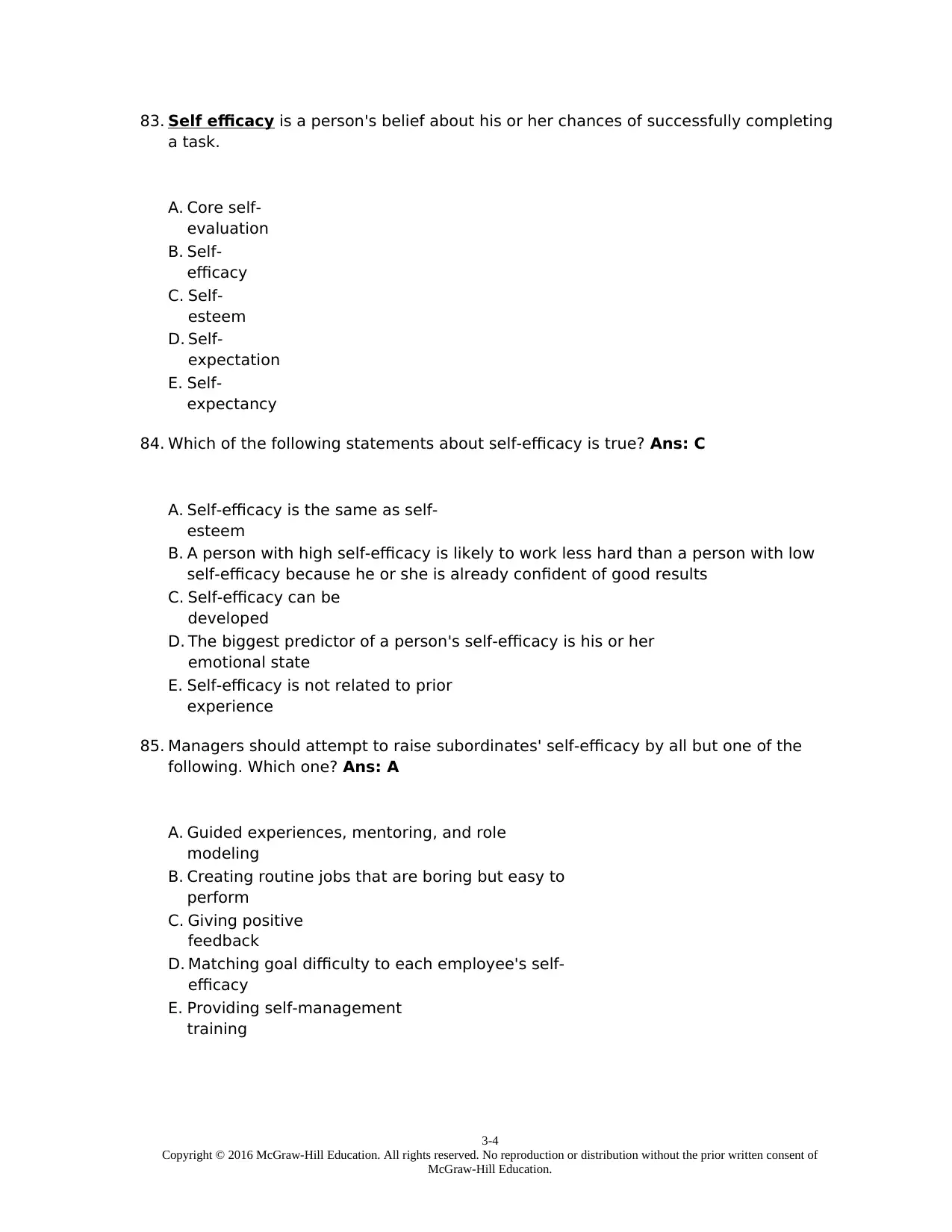
83. Self efficacy is a person's belief about his or her chances of successfully completing
a task.
A. Core self-
evaluation
B. Self-
efficacy
C. Self-
esteem
D. Self-
expectation
E. Self-
expectancy
84. Which of the following statements about self-efficacy is true? Ans: C
A. Self-efficacy is the same as self-
esteem
B. A person with high self-efficacy is likely to work less hard than a person with low
self-efficacy because he or she is already confident of good results
C. Self-efficacy can be
developed
D. The biggest predictor of a person's self-efficacy is his or her
emotional state
E. Self-efficacy is not related to prior
experience
85. Managers should attempt to raise subordinates' self-efficacy by all but one of the
following. Which one? Ans: A
A. Guided experiences, mentoring, and role
modeling
B. Creating routine jobs that are boring but easy to
perform
C. Giving positive
feedback
D. Matching goal difficulty to each employee's self-
efficacy
E. Providing self-management
training
3-4
Copyright © 2016 McGraw-Hill Education. All rights reserved. No reproduction or distribution without the prior written consent of
McGraw-Hill Education.
a task.
A. Core self-
evaluation
B. Self-
efficacy
C. Self-
esteem
D. Self-
expectation
E. Self-
expectancy
84. Which of the following statements about self-efficacy is true? Ans: C
A. Self-efficacy is the same as self-
esteem
B. A person with high self-efficacy is likely to work less hard than a person with low
self-efficacy because he or she is already confident of good results
C. Self-efficacy can be
developed
D. The biggest predictor of a person's self-efficacy is his or her
emotional state
E. Self-efficacy is not related to prior
experience
85. Managers should attempt to raise subordinates' self-efficacy by all but one of the
following. Which one? Ans: A
A. Guided experiences, mentoring, and role
modeling
B. Creating routine jobs that are boring but easy to
perform
C. Giving positive
feedback
D. Matching goal difficulty to each employee's self-
efficacy
E. Providing self-management
training
3-4
Copyright © 2016 McGraw-Hill Education. All rights reserved. No reproduction or distribution without the prior written consent of
McGraw-Hill Education.
Paraphrase This Document
Need a fresh take? Get an instant paraphrase of this document with our AI Paraphraser
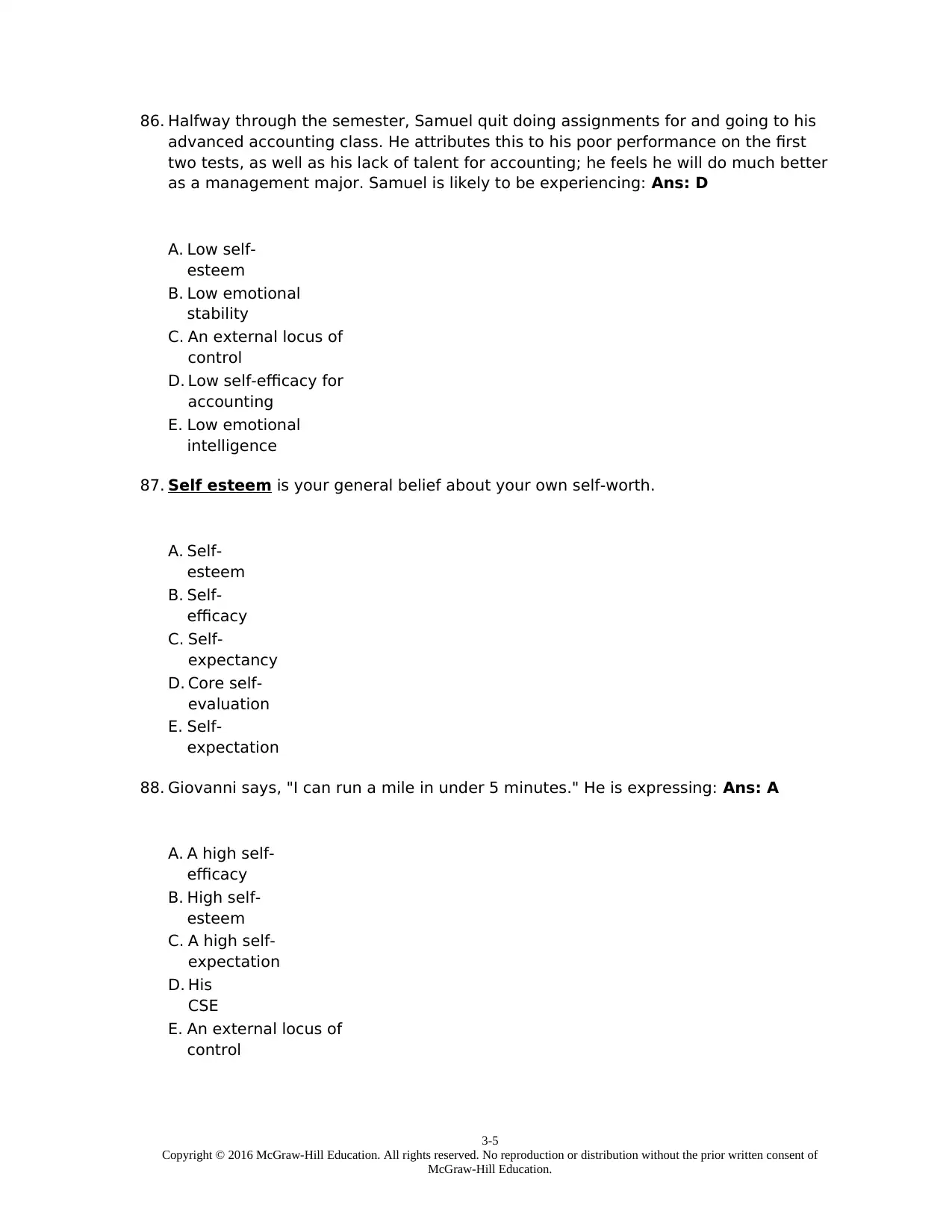
86. Halfway through the semester, Samuel quit doing assignments for and going to his
advanced accounting class. He attributes this to his poor performance on the first
two tests, as well as his lack of talent for accounting; he feels he will do much better
as a management major. Samuel is likely to be experiencing: Ans: D
A. Low self-
esteem
B. Low emotional
stability
C. An external locus of
control
D. Low self-efficacy for
accounting
E. Low emotional
intelligence
87. Self esteem is your general belief about your own self-worth.
A. Self-
esteem
B. Self-
efficacy
C. Self-
expectancy
D. Core self-
evaluation
E. Self-
expectation
88. Giovanni says, "I can run a mile in under 5 minutes." He is expressing: Ans: A
A. A high self-
efficacy
B. High self-
esteem
C. A high self-
expectation
D. His
CSE
E. An external locus of
control
3-5
Copyright © 2016 McGraw-Hill Education. All rights reserved. No reproduction or distribution without the prior written consent of
McGraw-Hill Education.
advanced accounting class. He attributes this to his poor performance on the first
two tests, as well as his lack of talent for accounting; he feels he will do much better
as a management major. Samuel is likely to be experiencing: Ans: D
A. Low self-
esteem
B. Low emotional
stability
C. An external locus of
control
D. Low self-efficacy for
accounting
E. Low emotional
intelligence
87. Self esteem is your general belief about your own self-worth.
A. Self-
esteem
B. Self-
efficacy
C. Self-
expectancy
D. Core self-
evaluation
E. Self-
expectation
88. Giovanni says, "I can run a mile in under 5 minutes." He is expressing: Ans: A
A. A high self-
efficacy
B. High self-
esteem
C. A high self-
expectation
D. His
CSE
E. An external locus of
control
3-5
Copyright © 2016 McGraw-Hill Education. All rights reserved. No reproduction or distribution without the prior written consent of
McGraw-Hill Education.
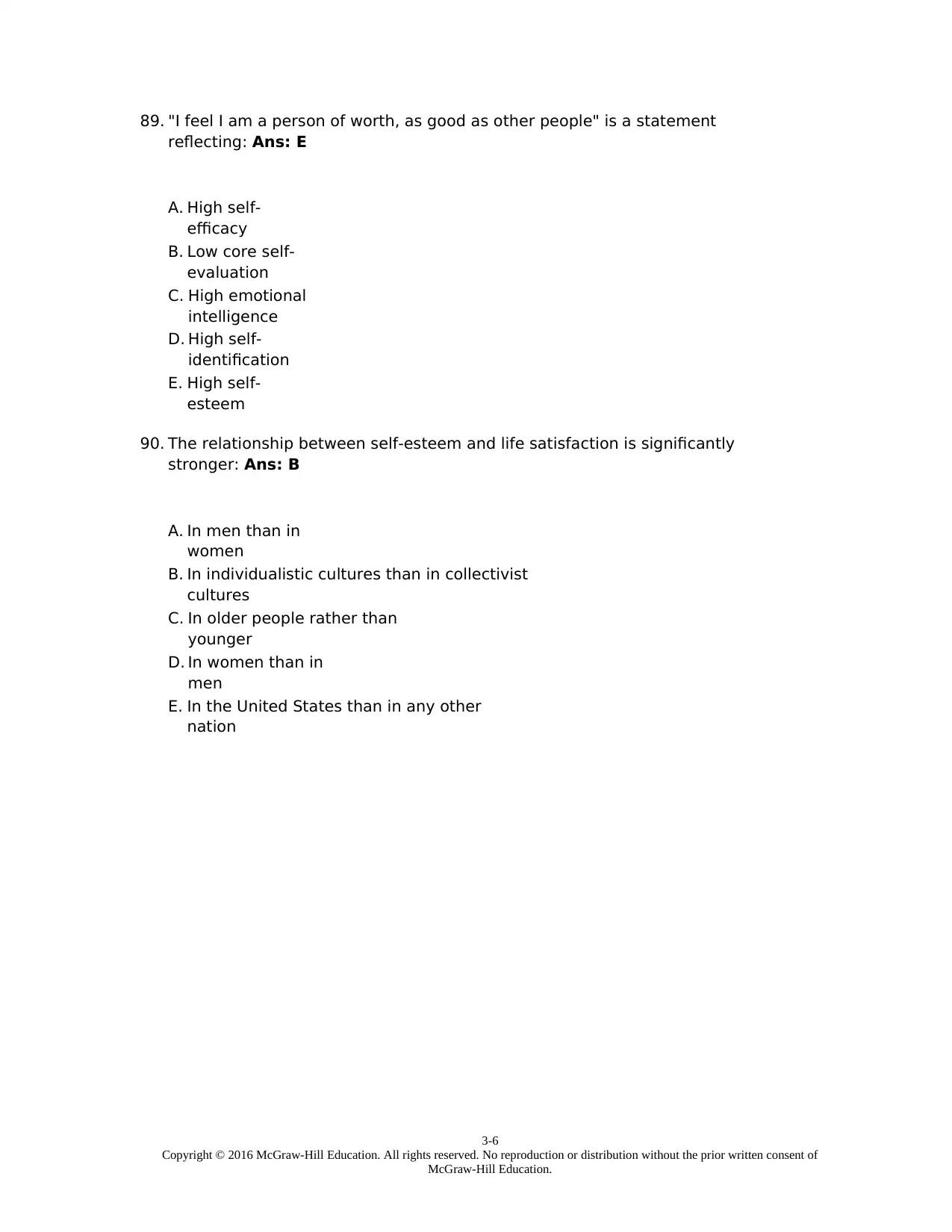
89. "I feel I am a person of worth, as good as other people" is a statement
reflecting: Ans: E
A. High self-
efficacy
B. Low core self-
evaluation
C. High emotional
intelligence
D. High self-
identification
E. High self-
esteem
90. The relationship between self-esteem and life satisfaction is significantly
stronger: Ans: B
A. In men than in
women
B. In individualistic cultures than in collectivist
cultures
C. In older people rather than
younger
D. In women than in
men
E. In the United States than in any other
nation
3-6
Copyright © 2016 McGraw-Hill Education. All rights reserved. No reproduction or distribution without the prior written consent of
McGraw-Hill Education.
reflecting: Ans: E
A. High self-
efficacy
B. Low core self-
evaluation
C. High emotional
intelligence
D. High self-
identification
E. High self-
esteem
90. The relationship between self-esteem and life satisfaction is significantly
stronger: Ans: B
A. In men than in
women
B. In individualistic cultures than in collectivist
cultures
C. In older people rather than
younger
D. In women than in
men
E. In the United States than in any other
nation
3-6
Copyright © 2016 McGraw-Hill Education. All rights reserved. No reproduction or distribution without the prior written consent of
McGraw-Hill Education.
⊘ This is a preview!⊘
Do you want full access?
Subscribe today to unlock all pages.

Trusted by 1+ million students worldwide
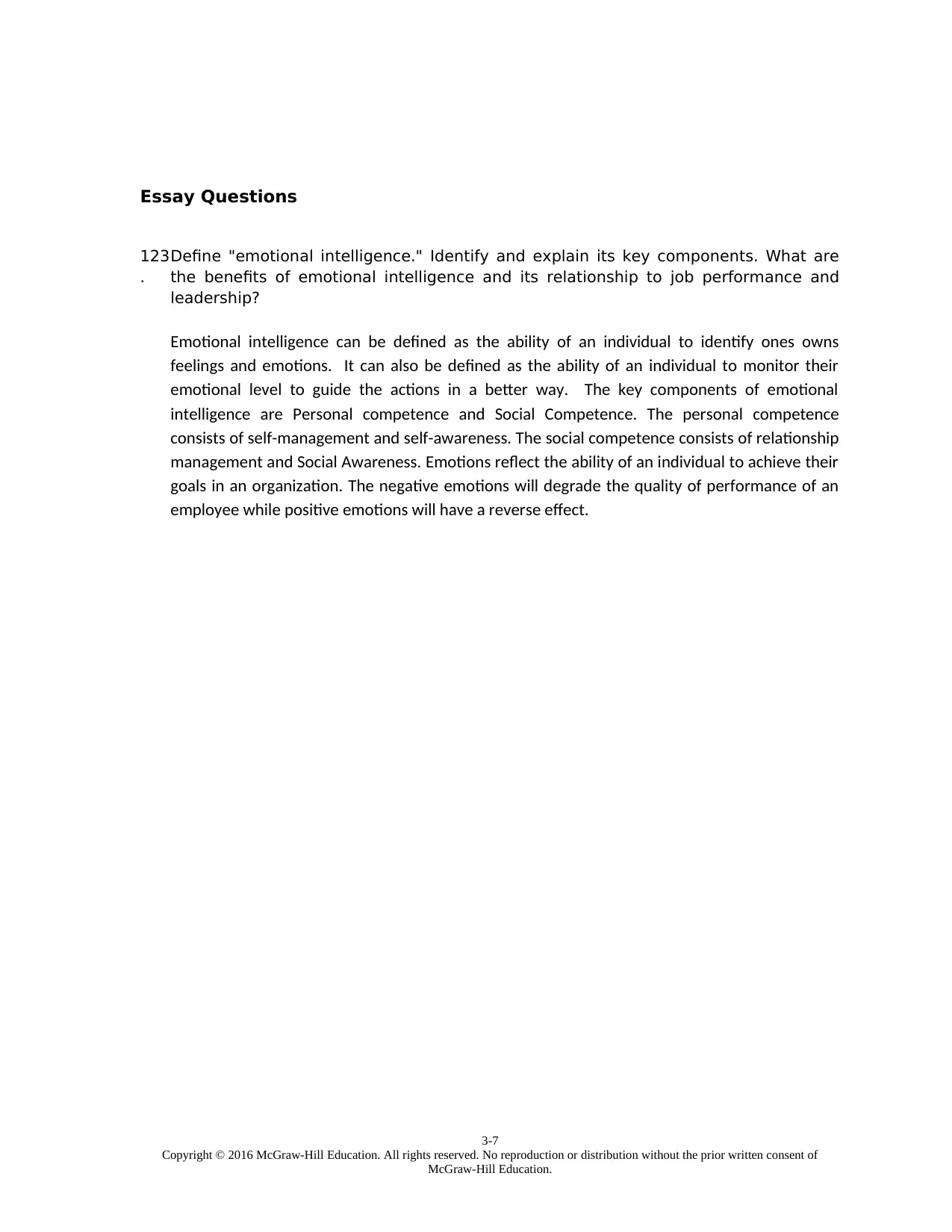
Essay Questions
123
.
Define "emotional intelligence." Identify and explain its key components. What are
the benefits of emotional intelligence and its relationship to job performance and
leadership?
Emotional intelligence can be defined as the ability of an individual to identify ones owns
feelings and emotions. It can also be defined as the ability of an individual to monitor their
emotional level to guide the actions in a better way. The key components of emotional
intelligence are Personal competence and Social Competence. The personal competence
consists of self-management and self-awareness. The social competence consists of relationship
management and Social Awareness. Emotions reflect the ability of an individual to achieve their
goals in an organization. The negative emotions will degrade the quality of performance of an
employee while positive emotions will have a reverse effect.
3-7
Copyright © 2016 McGraw-Hill Education. All rights reserved. No reproduction or distribution without the prior written consent of
McGraw-Hill Education.
123
.
Define "emotional intelligence." Identify and explain its key components. What are
the benefits of emotional intelligence and its relationship to job performance and
leadership?
Emotional intelligence can be defined as the ability of an individual to identify ones owns
feelings and emotions. It can also be defined as the ability of an individual to monitor their
emotional level to guide the actions in a better way. The key components of emotional
intelligence are Personal competence and Social Competence. The personal competence
consists of self-management and self-awareness. The social competence consists of relationship
management and Social Awareness. Emotions reflect the ability of an individual to achieve their
goals in an organization. The negative emotions will degrade the quality of performance of an
employee while positive emotions will have a reverse effect.
3-7
Copyright © 2016 McGraw-Hill Education. All rights reserved. No reproduction or distribution without the prior written consent of
McGraw-Hill Education.
1 out of 7
Your All-in-One AI-Powered Toolkit for Academic Success.
+13062052269
info@desklib.com
Available 24*7 on WhatsApp / Email
![[object Object]](/_next/static/media/star-bottom.7253800d.svg)
Unlock your academic potential
Copyright © 2020–2026 A2Z Services. All Rights Reserved. Developed and managed by ZUCOL.

